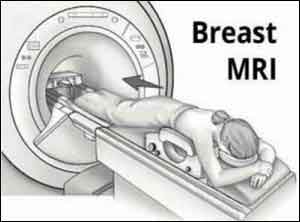- Home
- Editorial
- News
- Practice Guidelines
- Anesthesiology Guidelines
- Cancer Guidelines
- Cardiac Sciences Guidelines
- Critical Care Guidelines
- Dentistry Guidelines
- Dermatology Guidelines
- Diabetes and Endo Guidelines
- Diagnostics Guidelines
- ENT Guidelines
- Featured Practice Guidelines
- Gastroenterology Guidelines
- Geriatrics Guidelines
- Medicine Guidelines
- Nephrology Guidelines
- Neurosciences Guidelines
- Obs and Gynae Guidelines
- Ophthalmology Guidelines
- Orthopaedics Guidelines
- Paediatrics Guidelines
- Psychiatry Guidelines
- Pulmonology Guidelines
- Radiology Guidelines
- Surgery Guidelines
- Urology Guidelines
MRI effective in detecting postpartum breast cancers

Pregnancy-associated breast cancer, which is rare but often aggressive, was detected with MRI in 98% of cases reviewed in a recent article published in the September 2017 edition of the American Journal of Roentgenology (AJR).
The study reviewed cases of patients who had given birth within the previous 12 months. Breast MRI showed a sensitivity of 98% and changed surgical management for 28% of those patients. The study's authors, led by Kelly S. Myers of the Department of Radiology at Johns Hopkins Hospital, said breast MRI may play an important role in the management of pregnancy-associated breast cancers.
Titled, "Imaging Appearance and Clinical Impact of Preoperative Breast MRI in Pregnancy-Associated Breast Cancer," the study included 53 women, nine of whom presented during pregnancy and 44 during the first year postpartum. The sensitivity rate of MRI was 98%, or 52 of the 53 patients.
The authors said the study markedly expands on the current literature regarding breast MRI for patients with pregnancy-associated breast cancer. Although the study covered only 53 patients, the authors said it is to their knowledge the largest series of breast MRI examinations performed in the setting of pregnancy-associated breast cancer, showing that further research is warranted.
"Preoperative planning is especially important for patients with pregnancy-associated breast cancer because of the often aggressive nature of these cancers," the study said. "In contrast to the previous assumption that breast MRI would be of limited utility in this population, we found that it showed a pathologically proven larger tumor size or greater extent of disease in 23% of patients."
For more details click on the link : http://www.ajronline.org/doi/abs/10.2214/AJR.16.17124

Disclaimer: This site is primarily intended for healthcare professionals. Any content/information on this website does not replace the advice of medical and/or health professionals and should not be construed as medical/diagnostic advice/endorsement or prescription. Use of this site is subject to our terms of use, privacy policy, advertisement policy. © 2020 Minerva Medical Treatment Pvt Ltd